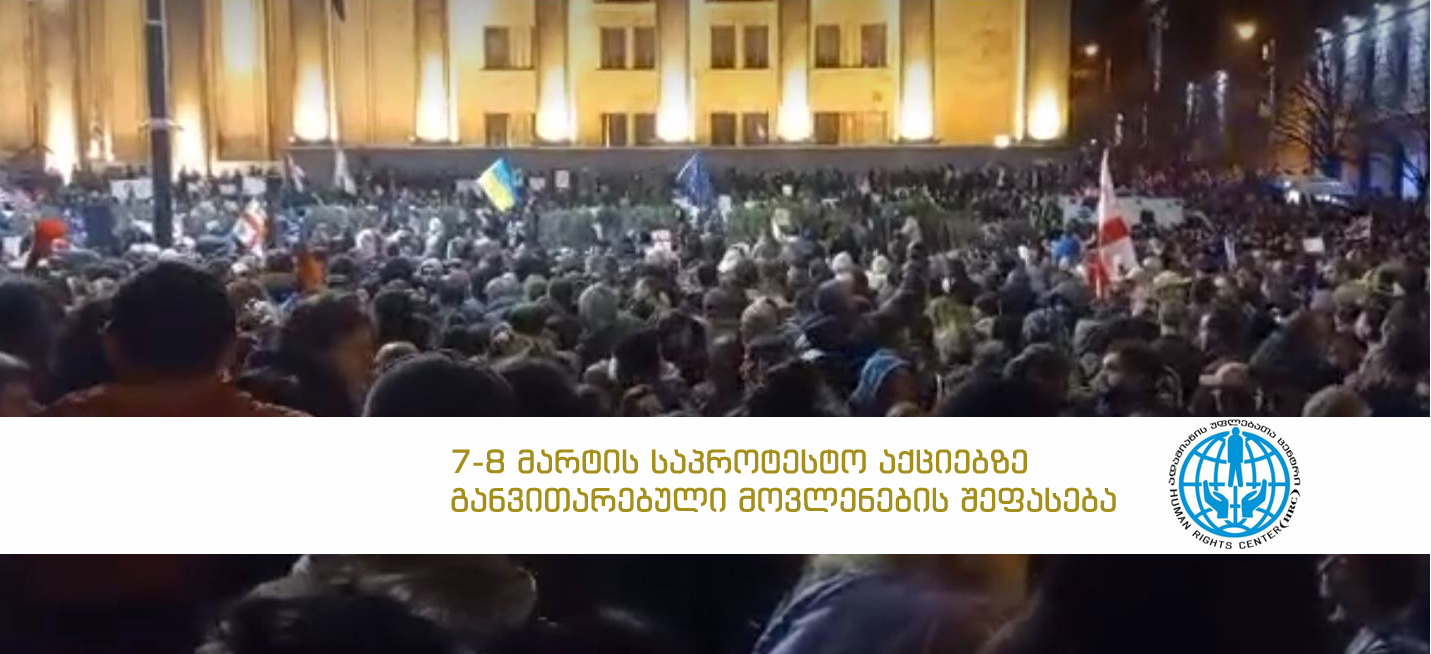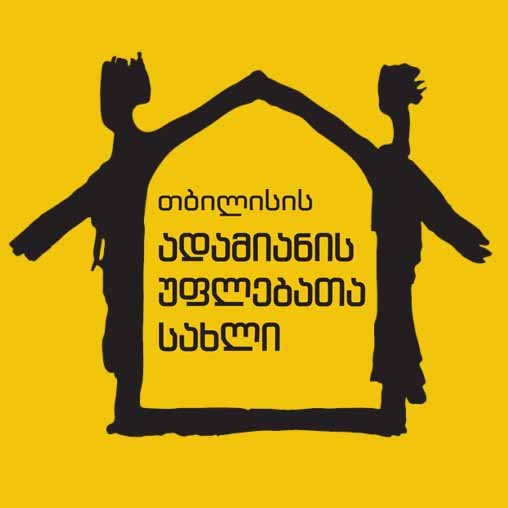News
Assessment of the Events Occurring at the Protest Rallies of March 7-8
09.03.2023

Font size
Human Rights Center is actively monitoring the protest rallies against the draft law on Foreign Influence Agents supported by the parliamentary majority of Georgian Dream. The monitoring aims at detecting the violations taking place during the assemblies and demonstrations and identifying the dangerous trends.
During the protest rally on March 7-8, the police used disproportionate force dispersing the protest and arresting protesters en masse. According to the statements by the Ministry of Interior, 133 protesters active at the rallies of 7-8 March were detained under articles 166 and 173 of the Code of Administrative Offenses. Further, the investigation was initiated into the offenses and incidents occurring at the protest rallies under articles 353 and 187 of the Criminal Code. Furthermore, the investigation was initiated into the facts of assault committed against police officers under article 3531 of the Criminal Code.
In order to assess the developments taking place at the rallies, it is important to see the facts in the sequence of their occurrence. On March 7, the meeting of the Bureau of the Parliament of Georgia, the parliamentary majority publicly announced that they are going to adopt the draft law in the first reading on March 9. For this reason, the speakers of the protest rally gathered at the back entrance of the Parliament called on the protesters to disband and resume the rally on March 9. After the rally was disbanded, unexpectedly, the parliamentary majority changed the agenda and began to hear the draft law 2 days ahead of schedule. The acceleration of the draft law hearings has caused even more dissatisfaction among the public. Much more protesters soon gathered again in front of the Parliament of Georgia. The civil protest was going within the boundaries of peaceful expression of opinions. Further, from the inception, the law enforcers present near the Parliament were acting under the law diverting vehicles away from Rustaveli Avenue and allowing the protesters to move freely.
According to the assessments by HRC, interference in the right to assembly and demonstration began on March 7 after 20:00 when the session in the Parliament was to be finalized having successfully adopted the bill in the first reading, so the need emerged to create conditions for the MPs to leave the Parliament from the yard through the gates located at the backs of the Parliament namely on Chitadze St and Chichinadze St. At this time, HRC observed that three buses of police forces arrived in the yard of the Parliament with the police creating unlawful cordons at the back gates hindering the free movement of the protesters notwithstanding that the protest was peaceful and no offenses were taking place. The above streets were the locations where the unlawful dispersal of the protesters began by means of tear gas and water cannons.
HRC believes that in dispersing the peaceful protest through special police means, the order of the Minister for Interior on Preserving, Wearing and Using the Special Means Available in the Arsenal of the Police was violated envisaging in article 4(2) that before using the special means, an authorised person shall warn the protesters about the intention to use the special means and allow the protesters to disband. Moreover, the police may use the special means only in case of necessity and only in the cases where other means would be inefficient for achieving the goals the police is pursuing. On March 7, the police used the special means in breach of the principle of necessity, while voicing the warning of their intention to apply the special means only after beginning to use them.
According to article 33 of the Law of Georgia on the Police, watercannons, armored vehicles and other special purpose vehicles may be used to prevent mass violations of the public order; to repel group attacks on the state and / or public facilities; to force a vehicle to stop or to detain an armed offender. Notwithstanding the fact that none of such instances have occurred on the protest rally of March 7, the police still used the watercannon without any legal grounds. Further, the special means of the kind of pepper sprays and watercannons in some instances were used in combination enhancing their effects contradicting the international standards.
The practice of democratic states shows that the protesters begin to act in an uncontrolled manner after the law enforcers violate the law. On March 7, due to the support in the first reading of the draft law in breach of the Constitution by the Parliament and due to the illegal actions by the Ministry of Interior, an aggressive response on the part of some of the groups of the protesters began with throwing the stones and other objects towards the police. Further, on March 8, some of the protesters attempted to picket the entrance to the Parliament of Georgia and by doing so the behavior of some of the protesters became aggressive going beyond the law.
According to the assessments by HRC and other human rights advocates providing the legal aid, it is an established standard that even in the cases where improper behavior is observed on the part of a certain protester or protesters, this does not make a peaceful assembly violent by default. Law enforcement agencies must differentiate between peaceful and violent participants. Only the facts of isolated violence or violent actions shown by some of the protesters during the rally may not serve by itself as a basis to restrict the right of peaceful citizens to assembly. Law enforcers should not treat the assembled people in a uniform manner when detaining them or when dispersing the assembly through force as a last resort.
HRC calls on the Minister of Interior to respect the right to assemblies and demonstrations enshrined in the Constitution of Georgia. It is important to hold liable every person who gave the order to unlawfully disperse the peaceful assembly and the illegally detained civil activists to be released. HRC also call on protesters to show the protest only through peaceful means.
Human Rights Center
News
25.04.2024
THE NON-GOVERNMENTAL AND MEDIA ORGANIZATIONS SUSPEND COOPERATION FORMATS WITH THE GOVERNMENT UNTIL THE RUSSIAN LAW IS DROPPED
24.04.2024




